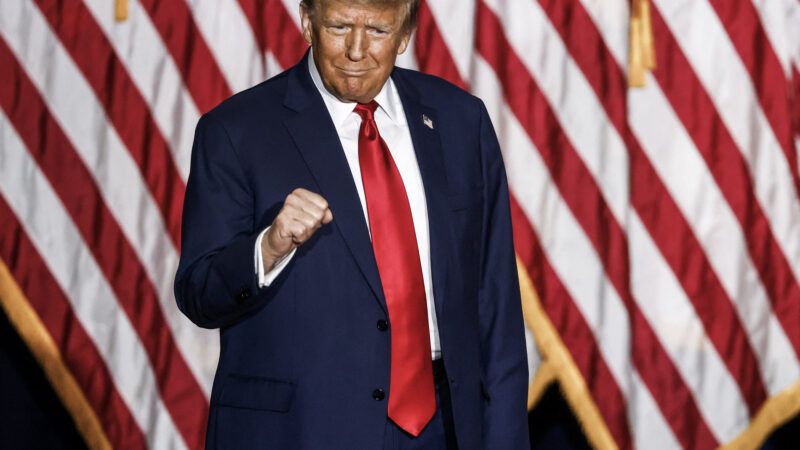Independents Hate the Trump-Biden Rematch
Donald Trump's winning numbers nonetheless contain hints of future losing; meanwhile, RFK Jr. is polling near 20 percent.

Now that the competitive portion of the major-party presidential primary season is over, with losers Nikki Haley (GOP) and Rep. Dean Phillips (D–Minn.) hanging around essentially as life insurance policies, Americans have 287 long days to let the reality they despise sink in: The two least popular presidents of the modern era, depressingly known quantities both, will stagger into election day at a combined 160 years of age to face an electorate howlingly dissatisfied about the direction of the country.
The sheer length of known-nominee season, unprecedented in American history, will likely play against the candidate who at the moment seems to have the head-to-head advantage: Donald Trump. That's partly because the people most inclined to vote against Trump—Democrats and independents—have been in denial about him winning a third consecutive GOP presidential nomination.
An Economist/YouGov poll taken January 7–9 showed just 45 percent of Democrats and 53 percent of independents believed that Trump would become the Republican nominee. The Biden campaign claimed pre-Iowa caucus that a majority of undecided voters did not grok that Trump would win. "Once you get to that head-to-head," a senior Biden campaign official told CNN, "the dynamics change. The world is different."
Biden needs that hopeful spin to become reality, since up until this point in the 2024 campaign he has persistently lagged Trump among the bloc that decides most presidential races: independents. Trump squeaked out a 43–42 percent victory over Hillary Clinton among independents and third-party voters in November 2016, after which his approval rate from the group stayed mired in the 30s for most of his presidency, culminating in a 52-43 percent loss to Biden in 2020. But within his first six months in the White House, Biden's support among independents crashed from 61 percent to 34 percent, where it has been languishing ever since.
In our two-party system, independents tend to serve as an electoral brake on the excesses of the party or executive in power; incumbents get the focus more than potential general-election challengers. Now that Trump has progressed to near-inevitability, the Biden theory goes, independents will start paying far more attention to the Republican, particularly his potentially opinion-swaying criminal trials.
Some of Tuesday's exit poll numbers coming out of New Hampshire buttress that theory. "We've never seen a gap between the independent vote and the Republican vote in an NH GOP primary like we saw last night," MSNBC numbers whiz Steve Kornacki tweeted Wednesday morning. Trump beat Nikki Haley 74 percent to 25 percent among Republicans, but Haley took independents 60 percent to 38 percent. And among the independent voters who participated in the GOP primary, noted The Wall Street Journal, a whopping 68 percent said they would not for Trump in the general election.
Luckily for Trump, the GOP nomination is decided by electorates that are a good deal more Republican than New Hampshire's. Unluckily for the presumptive nominee, his one-man polarization act is registering numerically even within the party he dominates. Exit polls showed 21 percent of Republican voters in the New Hampshire primary, and 15 percent of GOP Iowa caucus participants, saying they would not vote for Trump in November. Maybe those numbers reflect heat-of-the-moment sentiment, but it's hard to imagine them improving if the candidate is convicted of a January 6, 2021–related crime.
Meanwhile, registered independents, having grown by 46 percent nationwide since 2008, are now nearly as numerous as Republicans, with 35.3 million compared to 35.7 million as of last October. This swing vote, which has been the most revolted by the prospect of a Trump-Biden rematch, will be serially wooed and cajoled over the next 41 weeks.
The candidate best positioned to exploit the growth in both independents and political disillusionment is neither Biden nor Trump, but rather Robert F. Kennedy Jr. In a three-way matchup, according to RealClearPolitics' polling average, RFK stands at a Ross Perot–like 19.3 percent, compared to 37.5 for Trump and 33.8 for Biden.
Most Americans will see at least four names on their presidential ballot, the impact of which is hard to calculate. RFK, who this week got on his second state ballot, is gunning for all 50 states plus the District of Columbia; the Libertarian Party, which has had full ballot access the past few presidential elections, is on at least 36 ballots so far, and will likely get somewhere close to 50. The Green Party has 19 states so far and is making confident-sounding noises about exceeding 2020's 30; No Labels has 15 going on 28, and so on.
RFK, who channels similar anti-establishment and conspiratorial vibes as Trump, would have been a natural beneficiary of Trumpy support should Nikki Haley somehow have won. But if polls are right about potential convictions turning off some Trump voters, they could yet find their way to the independent's camp, joining the hardcore anti-COVID-lockdowners and those who simply prefer the famous name to the two dreary old guys.
The Libertarian Party, which has a three-election presidential streak of third-place finishes and a huge lead in small-party voter registration, is so far in 2024 lagging far behind RFK in name recognition. With the nominating national convention four months off, the leading competitors to date are former House/Senate candidate Chase Oliver, Future of Freedom Foundation President Jacob Hornberger, author and retired academic Michael Rectenwald, economist and ex-cop Mike ter Maat, tech entrepreneur Lars Mapstead, and Ron Paul enthusiast/Libertarian National Committee activist Joshua Smith.
If the past few elections are any guide, voters beginning today (or perhaps when Haley's campaign-coffin is nailed shut in South Carolina on February 24) will be giving themselves crash courses on nontraditional political parties and presidential candidates. The weird, negative political energy in the United States, having failed to significantly alter the major-party race, will now have to look elsewhere for expression.


Show Comments (125)